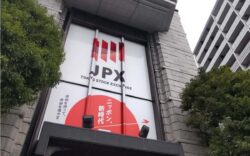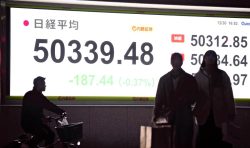
The Tokyo Stock Exchange
12:57 JST, December 19, 2021
Stock markets have been flooded with investment funds due to global monetary easing since the COVID-19 pandemic began, but the share prices for Japanese companies have been slow to recover. Japanese stocks are increasingly being excluded from global stock indexes, and if this trend continues, it could affect the companies’ fundraising.
Japanese firms are being tested as to whether they can increase their investments aimed at growth, which are said to be smaller than those of overseas companies, and attract more money to achieve further growth.
15 companies removed
In November, Morgan Stanley Capital International, Inc. (MSCI), a U.S. leading financial services provider, reviewed selected issues on its stock index, which is used by investors around the world as guide for fund management. Fifteen Japanese companies were removed from the index, among them well-known companies like Yamada Holdings Co., Casio Computer Co. and NH Foods Ltd.
Benefit One Inc. and Open House Co. were the only Japanese companies newly selected.
The MSCI index is calculated using stocks chosen from about 70 countries, and the issues are reshuffled twice a year.
The exclusion of Japanese firms means that “overseas money is flowing out of Japan,” according to an official of a major securities firm. This is because the world’s brokerages sell investment trusts linked to the MSCI index with assets totaling $16 trillion (about ¥1,800 trillion).
According to an estimate by Daiwa Securities Co., MSCI index-linked investment trusts sold about ¥220 billion worth of the 15 firms’ stock at the end of November because of the shuffle.
It was the third consecutive time since November last year that more than 10 Japanese companies were excluded from the MSCI index, and the most since 20 firms were removed in May 2011, immediately after the Great East Japan Earthquake.
Lagging behind
The removals were spurred by the slump in stock prices caused by the slow recovery of Japanese firms’ business performance. Stocks on the MSCI index are said to be chosen based on their market capitalization, among other factors.
Global stock markets, especially U.S. markets, increase their market capitalization through stock rallies after monetary easing around the world causes cash to flow into the country.
The Nikkei 225 pales when compared to these global stock markets.
While the Nikkei 225 Index was up 70% at the end of November, compared to the lows in March 2020 when stock prices were most sluggish amid the pandemic, the 30-stock Dow Jones industrial average was up 90%.
U.S. stocks, as represented by Google LLC, Amazon.com, Inc., Facebook Inc. (now Meta Platforms, Inc.) and Apple Inc. — dubbed GAFA — grew through aggressive investments in digitization and other areas, and investors raced to buy their stocks.
According to analysts, however, Japanese companies have been missing out on growth opportunities by not investing the money they accumulated, and their weak earning power is reflected in their stock prices.
Net selling
The most recent depreciation of the yen and appreciation of the U.S. dollar are also accelerating the trend. Foreign investors place importance on stock prices converted into U.S. dollars.
The dollar-based Nikkei 225 hit its lowest level of the year this month. Soaring prices of raw materials procured from overseas are seen as putting further pressure on Japanese firms’ earnings amid the yen’s depreciation.
Foreign investors account for 70% of the trading volume on the Tokyo Stock Exchange, and they sold ¥3.3 trillion more in stock than they bought last year. Net selling also amounted to about ¥250 billion in the last week of November alone.
Demand for funds for decarbonization is also on the rise. If Japanese firms continued to fail to attract the attention of overseas investors, they may struggle to raise money from stock markets.
Government support is also necessary to create an environment that attracts investment in businesses. Compared to the United States, Japan’s fiscal spending in growth areas remains low.
“It’s important to create an environment that facilitates the entry of companies into promising sectors by, for example, allocating government funds to areas in which investment is risky for companies alone,” said Shingo Ide, a senior researcher at NLI Research Institute.
Top Articles in Business
-

Prudential Life Insurance Plans to Fully Compensate for Damages Caused by Fraudulent Actions Without Waiting for Third-Party Committee Review
-

Narita Airport, Startup in Japan Demonstrate Machine to Compress Clothes for Tourists to Prevent People from Abandoning Suitcases
-

Japan, U.S. Name 3 Inaugural Investment Projects; Reached Agreement After Considerable Difficulty
-

JR Tokai, Shizuoka Pref. Agree on Water Resources for Maglev Train Construction
-

Toyota Motor Group Firm to Sell Clean Energy Greenhouses for Strawberries
JN ACCESS RANKING
-

Japan PM Takaichi’s Cabinet Resigns en Masse
-

Japan Institute to Use Domestic Commercial Optical Lattice Clock to Set Japan Standard Time
-

Israeli Ambassador to Japan Speaks about Japan’s Role in the Reconstruction of Gaza
-

Man Infected with Measles Reportedly Dined at Restaurant in Tokyo Station
-

Videos Plagiarized, Reposted with False Subtitles Claiming ‘Ryukyu Belongs to China’; Anti-China False Information Also Posted in Japan






















